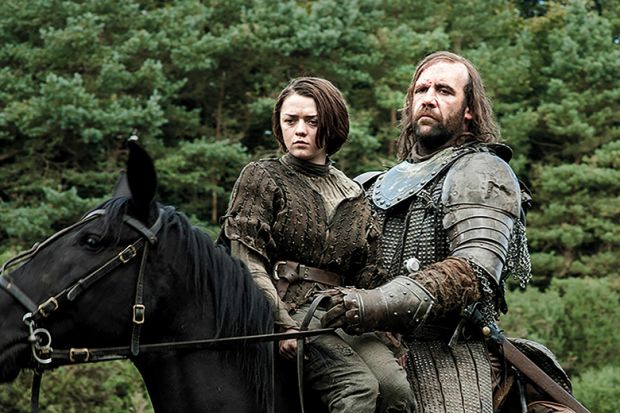With series seven now under way, Game of Thrones fans everywhere are trying to outguess each other about upcoming deaths in Westeros.
Milán Janosov, a PhD student at the Central European University, has proposed a new technique based on “the social position of characters”. In “Network Science Predicts Who Dies Next in Game of Thrones”, on the website of CEU’s Centre for Network Science, he notes that he is “probably not alone in wondering which of my favourite characters are going to meet their ends, and which will live on to the next season”.
In an attempt to answer this question, he has analysed more than 600 scenes from earlier seasons to produce data on how well-networked each character is.
Using this, Mr Janosov has produced a map of what his paper calls “the global social network of Westeros”, where “all the members of the great houses are marked with different colours…We can see a separate community around Jon Snow, indicating that the folks around the Wall only have a few connections with the rest of the realm. Tyrion has a separate role: he connects Daenerys Targaryen to the centre of the network, including King’s Landing, where we can see two large communities...forming a dense web at the heart of the story.”
Mr Janosov’s research has produced seven metrics “that proxy for different dimensions of social importance” and which, combined with analysis of the 61 characters who have already died, allow him to try to predict who else is not long for this world by looking for similar profiles. Apparently, he concludes (spoiler alert), “the ever-popular Arya Stark and the less friendly Hound” are both in danger, while “Cersei, currently sitting on the Iron Throne, and Baelish who is doing his best to get there, seem to be in a much better position”.
Yet how can mathematics model the destinies of fictional characters whose stories are determined by producers keen, for example, to keep alive those most popular with viewers?
“The really popular characters die more often than expected,” Mr Janosov told Times Higher Education, “and the fans are shocked. That’s one of the most fascinating thing about Game of Thrones, it doesn’t work like an ordinary TV show.”
But, as a committed fan, won’t his predictive algorithms spoil his own enjoyment of the show?
No, he replied. “I’m only predicting the likelihood of whether a character will die during the final two series, not when they will die.”
Register to continue
Why register?
- Registration is free and only takes a moment
- Once registered, you can read 3 articles a month
- Sign up for our newsletter
Subscribe
Or subscribe for unlimited access to:
- Unlimited access to news, views, insights & reviews
- Digital editions
- Digital access to THE’s university and college rankings analysis
Already registered or a current subscriber?










